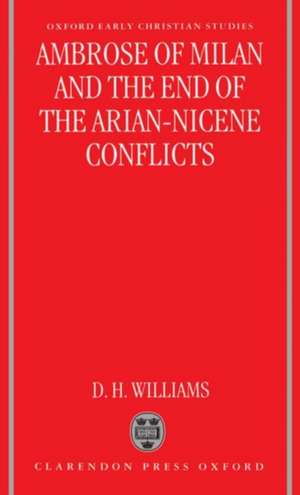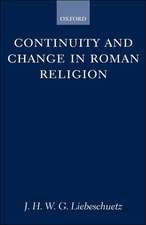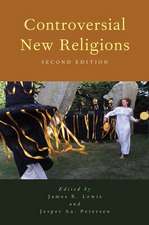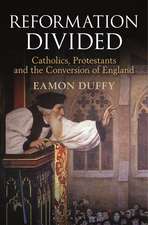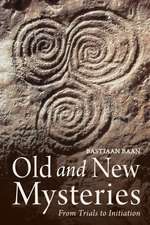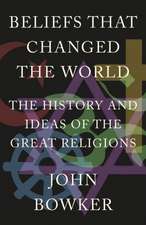Ambrose of Milan and the End of the Arian-Nicene Conflicts: Oxford Early Christian Studies
Autor Daniel H. Williamsen Limba Engleză Hardback – 4 mai 1995
Din seria Oxford Early Christian Studies
- 30%
 Preț: 500.48 lei
Preț: 500.48 lei - 12%
 Preț: 252.05 lei
Preț: 252.05 lei - 17%
 Preț: 582.40 lei
Preț: 582.40 lei - 19%
 Preț: 497.45 lei
Preț: 497.45 lei - 30%
 Preț: 582.12 lei
Preț: 582.12 lei - 28%
 Preț: 472.87 lei
Preț: 472.87 lei - 30%
 Preț: 528.78 lei
Preț: 528.78 lei - 30%
 Preț: 491.67 lei
Preț: 491.67 lei - 25%
 Preț: 627.62 lei
Preț: 627.62 lei - 17%
 Preț: 581.27 lei
Preț: 581.27 lei - 28%
 Preț: 437.84 lei
Preț: 437.84 lei - 27%
 Preț: 573.73 lei
Preț: 573.73 lei - 12%
 Preț: 616.72 lei
Preț: 616.72 lei - 20%
 Preț: 705.73 lei
Preț: 705.73 lei - 25%
 Preț: 568.80 lei
Preț: 568.80 lei - 30%
 Preț: 504.56 lei
Preț: 504.56 lei - 30%
 Preț: 542.84 lei
Preț: 542.84 lei - 26%
 Preț: 517.83 lei
Preț: 517.83 lei - 26%
 Preț: 598.30 lei
Preț: 598.30 lei - 30%
 Preț: 820.42 lei
Preț: 820.42 lei - 34%
 Preț: 1036.50 lei
Preț: 1036.50 lei - 30%
 Preț: 1107.11 lei
Preț: 1107.11 lei - 22%
 Preț: 361.61 lei
Preț: 361.61 lei - 34%
 Preț: 1326.79 lei
Preț: 1326.79 lei - 9%
 Preț: 255.03 lei
Preț: 255.03 lei - 34%
 Preț: 1123.50 lei
Preț: 1123.50 lei - 34%
 Preț: 845.94 lei
Preț: 845.94 lei - 14%
 Preț: 449.09 lei
Preț: 449.09 lei - 34%
 Preț: 1195.96 lei
Preț: 1195.96 lei - 22%
 Preț: 391.92 lei
Preț: 391.92 lei - 34%
 Preț: 1033.77 lei
Preț: 1033.77 lei - 34%
 Preț: 1255.59 lei
Preț: 1255.59 lei - 34%
 Preț: 819.81 lei
Preț: 819.81 lei - 19%
 Preț: 293.17 lei
Preț: 293.17 lei - 34%
 Preț: 1725.86 lei
Preț: 1725.86 lei - 34%
 Preț: 1761.02 lei
Preț: 1761.02 lei - 30%
 Preț: 947.60 lei
Preț: 947.60 lei - 34%
 Preț: 888.89 lei
Preț: 888.89 lei - 30%
 Preț: 1006.79 lei
Preț: 1006.79 lei - 30%
 Preț: 835.47 lei
Preț: 835.47 lei - 30%
 Preț: 1415.68 lei
Preț: 1415.68 lei - 34%
 Preț: 1199.53 lei
Preț: 1199.53 lei - 34%
 Preț: 756.65 lei
Preț: 756.65 lei - 34%
 Preț: 1107.76 lei
Preț: 1107.76 lei - 34%
 Preț: 873.24 lei
Preț: 873.24 lei - 34%
 Preț: 1446.26 lei
Preț: 1446.26 lei - 28%
 Preț: 338.52 lei
Preț: 338.52 lei - 34%
 Preț: 2061.53 lei
Preț: 2061.53 lei - 34%
 Preț: 1036.54 lei
Preț: 1036.54 lei
Preț: 1006.79 lei
Preț vechi: 1531.64 lei
-34% Nou
Puncte Express: 1510
Preț estimativ în valută:
192.68€ • 199.04$ • 160.35£
192.68€ • 199.04$ • 160.35£
Carte tipărită la comandă
Livrare economică 15-21 martie
Preluare comenzi: 021 569.72.76
Specificații
ISBN-13: 9780198264644
ISBN-10: 019826464X
Pagini: 270
Dimensiuni: 143 x 223 x 21 mm
Greutate: 0.48 kg
Ediția:New.
Editura: Clarendon Press
Colecția Clarendon Press
Seria Oxford Early Christian Studies
Locul publicării:Oxford, United Kingdom
ISBN-10: 019826464X
Pagini: 270
Dimensiuni: 143 x 223 x 21 mm
Greutate: 0.48 kg
Ediția:New.
Editura: Clarendon Press
Colecția Clarendon Press
Seria Oxford Early Christian Studies
Locul publicării:Oxford, United Kingdom
Recenzii
This new study ... makes a lively and challenging contribution to the literature on reception, as well as to our understanding of the events it describes.
There are patterns and paradigms here which are instructive for struggles of our own time.
The conclusions Williams has drawn emerge from an extremely detailed and careful reconstruction of the religious situation in Milan and of Ambrose's episcopate. It is impossible to exaggerate the difficulties involved in such a reconstruction...Prof. Williams's book repays careful study and reminds us of the simple reality that in the history of the church theology and politics cannot be severed.
complex and challenging study...the author's coverage of the subject is thorough, nicely organised, and well written...anyone interested in late Roman western religion, theological issues, and Ambrosian Milan will find it an important and even compelling study
It is a measure of William's achievement that on completing this book, one wonders how the generally accepted scholarly consensus on this matter could ever have been so misguided and simplistic. Williams has not only blown the dust off this concensus, he has completely overturned it. He is not only sensitive to, but prepared to confront and tackle, the complexities of fourth-century ideology, its councils and creed, imperial edicts and the changing role of its bishops.
Williams's work ... will be warmly by professional historians and graduate students interested in early church history ... His scholarship is broad and deep. Williams's Ambrose is in no sense a biography of Ambrose. It is alone in English as a critical historical account of the Ambrose-Homoian conflict in Milan.
complex and challenging study ... The author's coverage of the subject is thorough, nicely organized, and well written. Williams does a great deal to rediscover the "historical Ambrose" by thoroughly examining such matters as his episcopal election, his dismissal of a Homoian priest, and his leadership of the difficult and counter-productive Council of Aquileia ... anyone interested in late Roman western religion, theological issues, and Ambrosian Milan will find it an important and even compelling study.
enormous accomplishment
a succinct and well-reasoned account of the rise and fall of "Arianism" ... W. has presented a well-researched and convincing thesis ... W's study should prove fundamental to any future discussion of Western Arianism and Ambrose of Milan's role in the establishment of Nicene orthodoxy.
What Williams has given us is a great struggle between gradually awakening and deeply loyal theological traditions and not the older "triumph-over-all-comers" of the Nicene faith.
The thesis is bold and powerfully stated, and is entirely successful in its criticism of easy assumptions about an inevitable 'triumph of orthodoxy', and of the traditional hagiographical portrait of Ambrose. Williams's sympathetic reconstruction of a Milanese homoean community is ... one of his most signficant contributions, and even those unconvinced by his conclusions will find them invigorating. That Williams ultimately poses more questions than he answers does not detract from his achievement. He has amply succeeded in his declared intention of rescuing Ambrose from the hagiographers, and the western homoeans from their vituperators. By providing Ambrose with such worthy opponents, moreover, he allows us to appreciate the bishop's achievement in surviving.
Williams offers a compelling interpretation of the theological struggles of the late fourth century, and their relation to the political realities of the era,,,Williams shows a profound knowledge of the relevant texts of the period.
His book makes an important contribution. He has reminded us that if we are to appreciate Ambrose in full, we must take full account of the theological and spiritual passions which motivated his soul.
There are patterns and paradigms here which are instructive for struggles of our own time.
The conclusions Williams has drawn emerge from an extremely detailed and careful reconstruction of the religious situation in Milan and of Ambrose's episcopate. It is impossible to exaggerate the difficulties involved in such a reconstruction...Prof. Williams's book repays careful study and reminds us of the simple reality that in the history of the church theology and politics cannot be severed.
complex and challenging study...the author's coverage of the subject is thorough, nicely organised, and well written...anyone interested in late Roman western religion, theological issues, and Ambrosian Milan will find it an important and even compelling study
It is a measure of William's achievement that on completing this book, one wonders how the generally accepted scholarly consensus on this matter could ever have been so misguided and simplistic. Williams has not only blown the dust off this concensus, he has completely overturned it. He is not only sensitive to, but prepared to confront and tackle, the complexities of fourth-century ideology, its councils and creed, imperial edicts and the changing role of its bishops.
Williams's work ... will be warmly by professional historians and graduate students interested in early church history ... His scholarship is broad and deep. Williams's Ambrose is in no sense a biography of Ambrose. It is alone in English as a critical historical account of the Ambrose-Homoian conflict in Milan.
complex and challenging study ... The author's coverage of the subject is thorough, nicely organized, and well written. Williams does a great deal to rediscover the "historical Ambrose" by thoroughly examining such matters as his episcopal election, his dismissal of a Homoian priest, and his leadership of the difficult and counter-productive Council of Aquileia ... anyone interested in late Roman western religion, theological issues, and Ambrosian Milan will find it an important and even compelling study.
enormous accomplishment
a succinct and well-reasoned account of the rise and fall of "Arianism" ... W. has presented a well-researched and convincing thesis ... W's study should prove fundamental to any future discussion of Western Arianism and Ambrose of Milan's role in the establishment of Nicene orthodoxy.
What Williams has given us is a great struggle between gradually awakening and deeply loyal theological traditions and not the older "triumph-over-all-comers" of the Nicene faith.
The thesis is bold and powerfully stated, and is entirely successful in its criticism of easy assumptions about an inevitable 'triumph of orthodoxy', and of the traditional hagiographical portrait of Ambrose. Williams's sympathetic reconstruction of a Milanese homoean community is ... one of his most signficant contributions, and even those unconvinced by his conclusions will find them invigorating. That Williams ultimately poses more questions than he answers does not detract from his achievement. He has amply succeeded in his declared intention of rescuing Ambrose from the hagiographers, and the western homoeans from their vituperators. By providing Ambrose with such worthy opponents, moreover, he allows us to appreciate the bishop's achievement in surviving.
Williams offers a compelling interpretation of the theological struggles of the late fourth century, and their relation to the political realities of the era,,,Williams shows a profound knowledge of the relevant texts of the period.
His book makes an important contribution. He has reminded us that if we are to appreciate Ambrose in full, we must take full account of the theological and spiritual passions which motivated his soul.
